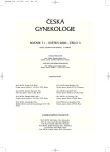Prevention of Rh (D) Alloimmunization in Rh (D) Negative Women in Pregnancy and after Birth of Rh (D) Positive Infant
Prevence Rh (D) aloimunizace u Rh (D) negativních žen v těhotenství a po porodu Rh (D) pozitivního dítěte
Cíl studie:
Přehled současných znalostí o významu a efektivitě podání anti-D imunoglobulinu při prevenci Rh (D) aloimunizace u Rh (D) negativních žen v průběhu těhotenství a po porodu Rh (D) pozitivního plodu.
Typ studie:
Přehledový článek.
Název a sídlo pracoviště:
Gynekologicko-porodnická klinika, Ústav lékařské genetiky a fetální medicíny LF Univerzity Palackého a FN Olomouc, Ministerstvo zdravotnictví ČR, Praha, oddělení péče o matku a dítě, odbor zdravotní péče a farmacie.
Předmět a metoda studie:
Rešerše z literatury a z medicínských databází.
Závěr:
Riziko Rh (D) aloimunizace u Rh (D) negativních žen v průběhu prvního těhotenství a bezprostředně po porodu Rh (D) pozitivního dítěte je asi 1 %. Antenatální podání 100 μg (500 IU) anti-D ve 28. a 34. týdnu těhotenství může snížit riziko aloimunizace asi na 0,2 %. Nežádoucí účinky nebyly popsány. Podání anti-D imunoglobulinu všem Rh (D) negativním ženám do 72 hodin po porodu Rh (D) pozitivního dítěte, pokud v jejich séru nebyla prokázána přítomnost anti-D protilátek, snižuje riziko Rh (D) aloimunizace. Efekt je patrný bez ohledu na kompatibilitu mezi matkou a dítětem v systému AB0. Optimální dávka anti-D není přesně stanovena. Anti-D je nutno podat i v případě, že Rh (D) status dítěte není znám.
Klíčová slova:
anti-D, Rh (D) aloimunizace
Authors:
M. Lubušký 1,2; M. Procházka 1; L. Krejčová 3; M. Větr 1; J. Šantavý 2; Milan Kudela 1
Authors‘ workplace:
Gynekologicko-porodnická klinika LF UP a FN, Olomouc, přednosta prof. MUDr. M. Kudela, CSc.
1; Ústav lékařské genetiky a fetální medicíny LF UP a FN, Olomouc, přednosta prof. MUDr. J. Šantavý, CSc.
2; Ministerstvo zdravotnictví ČR, oddělení péče o matku a dítě, odbor zdravotní péče a farmacie, Praha
3
Published in:
Ceska Gynekol 2006; 71(3): 173-179
Category:
Original Article
Overview
Objective:
The objective of this review was to assess the effects of antenatal anti-D immunoglobulin on the incidence of Rhesus D alloimmunization when given to Rh-negative women without anti-D antibodies and assess the effects of giving anti-D to Rhesus negative women, with no anti-D antibodies, who had given birth to a Rhesus positive infant.
Design:
A review article.
Setting:
Department of Obstetrics and Gynecology, Department of Medical Genetics and Fetal Medicine, University Hospital, Olomouc, Ministry of Health, Czech Republic. Subject and Method: We searched the Cochrane Pregnancy and Childbirth Group trials register, refence lists of relevant articles and bibliographies.
Conclusion:
The risk of Rhesus D alloimmunization during or immediately after a first pregnancy is about 1%. Administration of 100 μg (500 IU) anti-D to women in their first pregnancy can reduce this risk to about 0.2% without, to date, any adverse effects. Anti-D, given within 72 hours after childbirth, reduces the risk of RhD alloimmunization in Rhesus negative women who have given birth to a Rhesus positive infant. However the evidence on the optimal dose is limited.
Key words:
anti-D, rhesus alloimmunization
Labels
Paediatric gynaecology Gynaecology and obstetrics Reproduction medicineArticle was published in
Czech Gynaecology

2006 Issue 3
Most read in this issue
- Discrepancy of Ultrasound Biometric Parameters of the Head (HC - Head Circumference, BPD - Biparietal Diameter) and Femur Length in Relation to Sex of the Fetus and Duration of Pregnancy
- Serum Antibodies against Annexin V and Other Phospholipids in Women with Fertility Failure
- Intrahepatic Cholestasis of Pregnancy – Four Case Reports
- Prevention of Rh (D) Alloimmunization in Rh (D) Negative Women in Pregnancy and after Birth of Rh (D) Positive Infant
